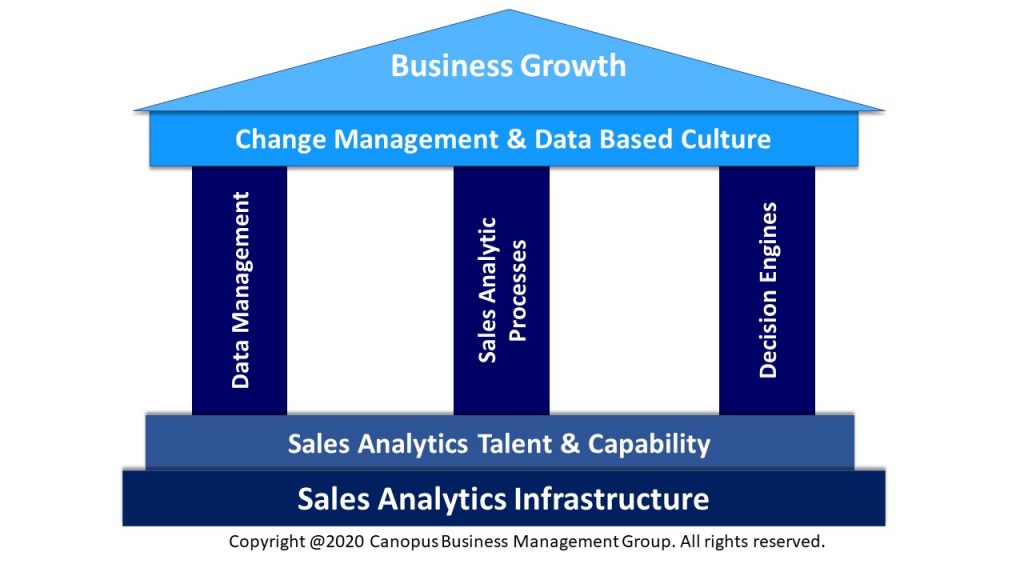Sales Analytics Framework
Sales Analytics Framework
The Analytics Framework for Sales aims to support a long term strategy of applying analytics in sales and to integrate seamlessly with remaining part of the organization’s analytics strategy.
There are 3 important pillars for effective deployment of Sales Analytics Framework. A framework like this, when implemented consistently, will shift Sales Analytics from a tactical business enabler to strategic business enabler.

There are two important prerequisites that act as a foundation for the 3 pillars and at least one over-arching philosophy to derive best out of the Sales Analytics Framework. Let us look at what are they:
Business Benefit of deploying Sales Analytics Framework:
Business Growth
The ultimate business objective of using Sales Analytics to help meet organizational long term and short term goals such as Market Share, Revenue Growth, Profitability, Customer Retention, Cross-sell, Upsell, Referral business, etc
Overarching Philosophy:
Change Management & Data Based Culture
Ultimately leaders play a big role in deciding how the outcomes of analytics are put in practice during the decision making process. Businesses have their priorities that are time sensitive and hence sales directors play a big role in deciding how these would be actually applied. Driving a culture of data or fact based decision making within the organization should be one priority when it comes to sales analytics. The benefits of sales analytics grow multi-fold when cultural change occurs.
The Pillars:
Data Management
The first and foremost success factor in Sales Analytics is the ability to acquire, clean, organize, integrate, describe, share, govern and store data to be used for analytics. Data is usually acquired from various sources. Most organizations hit a road-block right at this stage of the journey. The next step is to clean and integrate data from various sources so as to enrich its value before performing required analytics.
Sales Analytic Processes
The core sales analytic processes include the ability to enrich the data through advanced analytics & data science and to provide, visualization, exploratory data analytics (EDA), business insights to drive sales, develop predictive models such as propensity, lead scoring, up-sell, cross-sell prediction, etc. The ongoing optimization and deployment of models in the production environment and their regular refinement are all integral to Sales Analytic Processes. The element of focus for us in Sales Analytics Processes is to answer some of the design questions keeping in mind the above end states, such as Measure of Success of Analytics Program, what analytics are we going to perform, what data and models are we going to use and how will we share the results. Learn more about How can Sales Managers leverage Analytics?
Decision Engines
How do analytics capabilities deliver business value. Traditional outcomes of analytics decision engines were linked to information delivery and visualization enabled through Online Analytical Processing (OLAP)and data mining. On the other spectrum, insight discovery and integration to decision making processes are capabilities that add business value.
The Prerequisites
Sales Analytics Infrastructure
To start with organizations can work with minimal infrastructure for analytics, but to scale analytics capability, definitely investment in infrastructure is a must. Analytics Infrastructure, not restricted to Sales Analytics, includes databases and data warehouses, statistical and data mining systems, scoring engines, grids and cloud storage ,etc., The question that new entrants frequently ask is, is it not possible to start Sales Analytics without these. The answer is that it is possible. With SaaS, it is possible to put together low cost infrastructure to get started with sales analytics. In addition to storage and handling, software tools required for sales analytics are also part of the assets. While there are standard and custom tools, the best to start would be Tableau, R, Python, SAS, RapidMiner, Orange, etc. Learn more about Guide to Selecting Sales Analytics Software Tools
Sales Analytics Talent & Capability
Quite often this is the most ignored area in analytics and is also a pitfall. Organizations get neck deep in creating analytics infrastructure, acquiring talent to manage these, and analytics talent with IT capability to deploy these tools, but they fail to understand that business users are really the ones who need upskilling. If they fail to recognize and resist the usage of analytics in their daily work management, Sales Analytics will only remain a pilot project to showcase. Lead More about What specific analytical skills are needed for Sales Managers in the era of Analytics?
#nilakantasrinivasan-j #canopus-business-management-group #B2B-client-centric-growth #sales-analytics #business-growth
